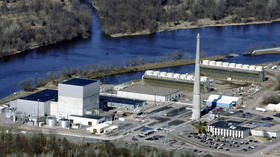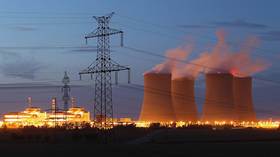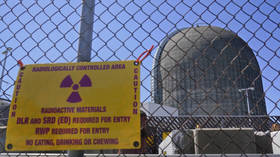US nuclear plant management admit to radioactive leak

The authorities in the northern US state of Minnesota revealed on Thursday that a nuclear power plant near Minneapolis had suffered a radioactive water spill amounting to over 1.5 million liters. Xcel Energy, which owns the Monticello Nuclear Generating Plant, is working to clean up the spill and insists there is no danger to the general public.
The Minnesota Pollution Control Agency (MPCA) said that around 400,000 gallons of tritiated water leaked from a broken pipe at the facility. The leak was first discovered on November 22, and its source was found on December 19 and patched “soon after.”
The authorities decided to keep the public in the dark about the incident, while Xcel Energy and the state were “actively managing” the situation to prevent the underground plume of irradiated water from spreading to the nearby Mississippi River, MPCA assistant commissioner Kirk Koudelka told the Minneapolis Star-Tribune.
“Now that we have all the information about where the leak occurred, how much was released into groundwater, and that contaminated groundwater had moved beyond the original location, we are sharing this information,” MPCA spokesman Michael Rafferty added on Thursday.
“This does not present a public health or drinking water issue,” Christopher Clark, Xcel’s president for Minnesota, said. He admitted the tritiated water is “well above” the 20,000 picocuries standard mandated by the Environmental Protection Agency (EPA), being “in the millions” directly below the plant.
The city of Monticello issued a statement, saying its drinking water supply was not affected by the leak, which happened outside the area from which they draw groundwater for municipal wells.
The contaminated water has not been detected beyond the plant’s perimeter, Xcel told KMSP-TV. An estimated 25% of the water has been recovered and pumped into a treatment system on site. The company is considering building storage tanks or a retention pond for the project, which could take a year or more.
Viktoria Mitlyng, a spokeswoman for the US Nuclear Regulatory Commission (NRC), said the leak was well below the NRC safety threshold and that the plan is not in violation of regulations. Tritium leaks “are not uncommon for nuclear plants,” she added.
The Monticello facility had a leak of around 2,000 gallons (7,500 liters) in 1981, with some of the water reaching the river, but state health officials said it posed no danger to wildlife or public health.
In January, Xcel sent an application to the NRC to extend Monticello’s license for another 20 years beyond 2030, when its current permit is set to expire. The company said the extension is “critical” to comply with a new Minnesota law which mandates 100% carbon-free electricity by 2040.
Tritium is a mildly radioactive isotope of hydrogen, often found in water used to cool nuclear reactors. The only way it can affect people is if they breathe it in or drink tritiated water, said Daniel Huff, an assistant commissioner at the Minnesota Department of Health, adding that the public’s exposure from a nuclear power plant “should be zero.”














